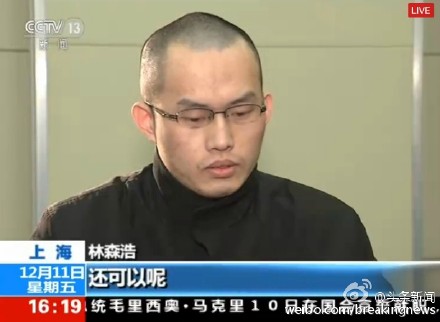Med school roommate poisoner executed
By Cao Yin (chinadaily.com.cn) Updated: 2015-12-11 17:17
|
 |
|
Lin was interviewed by CCTV on Dec 7, 2015, four days before he was executed. [Photo/Weibo.com] |
The former medical student convicted of poisoning his university roommate in Shanghai was executed on Friday.
The Supreme People’s Court confirmed the execution of 29-year-old Lin Senhao, who was sentenced to death for killing his roommate, Huang Yang, by putting a deadly poison in Huang’s water dispenser at Fudan University. Huang died in April 2013 of liver, kidney and lung failure.
Lin’s father, Lin Zunyao, told Beijing News that he had a final visit with his son that lasted about 10 minutes and his son repeatedly said he was sorry.
The Shanghai No 2 Intermediate People’s Court, which conducted the first trial and sentenced Lin, had arranged for the family visit. An intermediate court later enforced the verdict in the high-profile case which attracted attention nationwide.
Related:
Courts must apply the law and not be swayed by online debate
THE SUPREME PEOPLE'S Court has approved the death sentence handed down to Lin Senhao, a student at Fudan University in Shanghai, for murdering his roommate. His father says he expects the execution to be carried out within days. Discussions about whether the country should still have the death penalty may continue, but this particular case has come to its conclusion, says a Beijing Times editorial:
Whatever a court's ruling is, it is always open to challenge, and there are always those who want to abolish capital punishment and those who defend it.
We live in an age of mass media, and it is impossible to prevent judges from reading newspapers and browsing social networks. We must accept the fact that judges are aware of the public opinion about a case.
However, the courts should not be swayed by it. They should base their judgments solely on the law and the facts of the case.
Concerning Lin's case, the discussions about the death penalty might continue, but the case should come to an end now that all the appeals have been made and the verdict upheld. The media also need to act responsibly, and respect the judicial system if it is following due procedure. The media may express opinions but must not try to influence the outcome of a case, as that is illegal and creates injustice.
Following the supreme court's approval of Lin's death penalty, scholars and media outlets are still discussing about whether death penalty should be challenged, but the appeal process has been completed and the court's verdict stands.
The judiciary, the media and the public all need to interact with each other in an acceptable way so as to establish the rule of law.